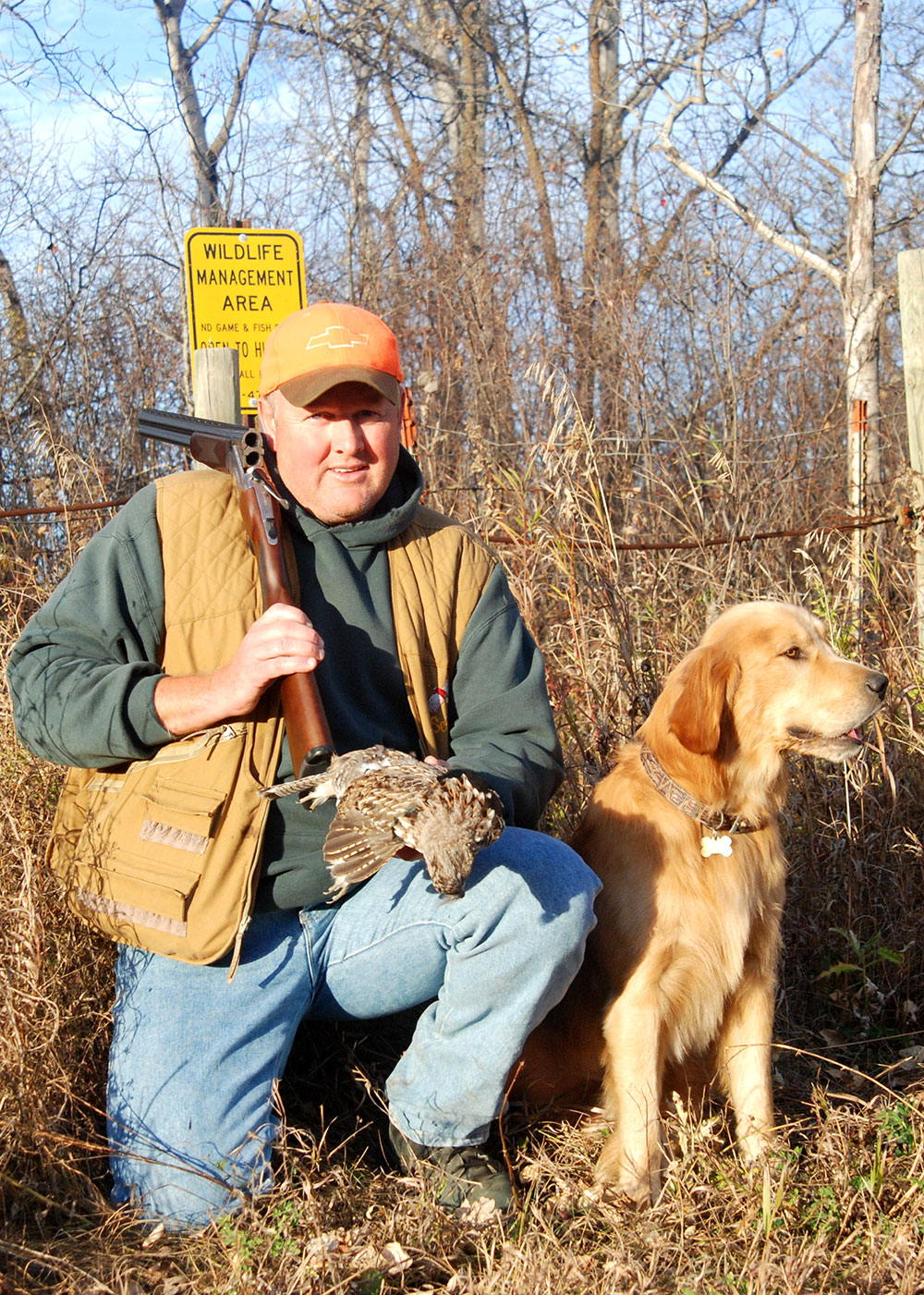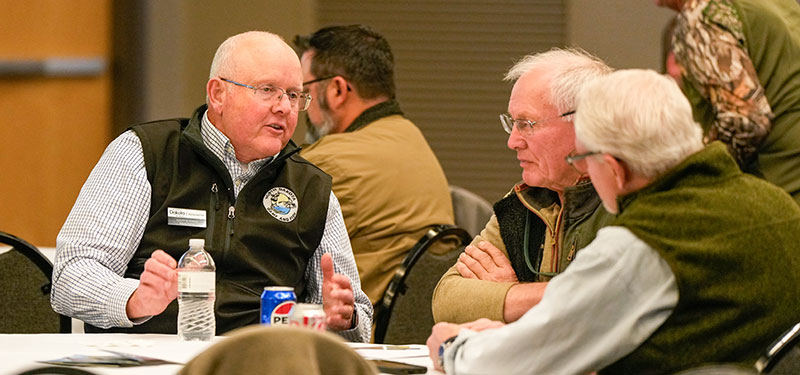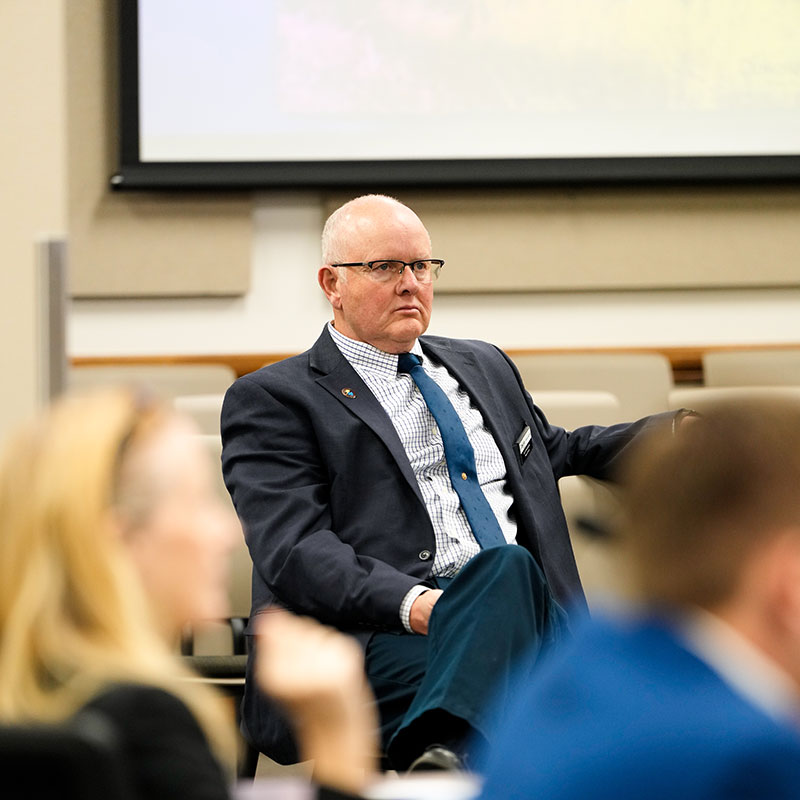His Door was Always Open
Ron Wilson

Following an extended run and an equally impressive reach into the state’s natural resources community, Scott Peterson announced his retirement as deputy director of the North Dakota Game and Fish Department effective earlier this month.
Terry Steinwand, former Department director who retired in 2021, appointed Peterson as deputy director in 2014. Prior to that, Peterson, a 40-year employee with the agency, was the wildlife resource management section leader at the 32,000-acre Lonetree Wildlife Management Area in Sheridan and Wells counties. His management responsibilities also extended to public lands in Foster and Eddy counties.
North Dakota OUTDOORS staff interviewed Peterson about his decades-long career with the Game and Fish Department and what the future might bring.
NDO: Why did you choose the career that you did? And you never jumped ship, took your interests and talents elsewhere. Why is that?
Peterson: : I grew up with a love for hunting and at a young age I knew that’s the only thing I wanted to do. In high school, when people typically start thinking about what they want to do for the rest of their life, I knew this is what I wanted to do, and I never seriously considered anything else. As I got closer to graduating from high school, I started doing a little research about what I need to do to work in this field. Fortunately, there was a gentleman, a local guy, working out of the Northern Prairie Wildlife Research Center, which at that time was under the U.S. Fish and Wildlife Service, who I talked to several times, and he gave me some advice. He said if I wasn’t a big college type kid, then spend a couple of years at Bottineau and see where that takes you. And that’s what I did. So, I transferred from Bottineau after I got my associate’s degree to Fargo, and the rest is history. The reason I stayed with the Department my entire career, and I know this is going to sound corny, but more than anything else the Department has been so good to us and they never gave me a reason to think about leaving. And I would say that for a lot of aspects of my life. And, again, the Department is the only place I ever wanted to work.
NDO: You’ve been with the Game and Fish Department for 40 years, starting first as a seasonal employee for a number of years, and have seen and experienced a lot of change. What pops out when considering North Dakota’s natural resources over those four decades?

Peterson: The obvious one would be the change in habitat … not just the quantity, but the quality, too. The Conservation Reserve Program came in about the same time I got hired and grass was being put on the landscape in the late 1980s. For a lot of years, it was the land of milk and honey. Right? And it wasn’t anything the Department did. It was just a benefit that was provided by the USDA and was kind of dropped into our lap. And then you look at it today … we’re losing habitat every day. And then when we go to advisory board meetings across the state, the people we’re seeing at those meetings are getting frustrated because they can’t get a deer license every year. It’s real. But we try to do what we can, chip away and try to add acres. And we’re doing that. The thing is, I think a lot of times people look back at the CRP days and that’s what their vision is for the next 20 years, and I don’t think in a lot of ways that’s realistic. When I sit around a campfire and talk to my grandkids about the good old days, it’s going to be CRP. I have older brothers who remember the soil bank days and it’s the same thing. Anyway, I would say the biggest change from a natural resource standpoint is just the decrease in quality and quantity of habitat.
NDO: From Game and Fish constituents to people you’ve worked with, how do you think this various assemblage of people would describe your career?
NDO: The agency’s constituents are many and it’s certain some hold misconceptions about those who work here, and the decisions made. What’s your take on what goes on behind the walls at the Bismarck headquarters, district offices and in the field?
Peterson: We work in a career where our constituents are very passionate about their hunting and fishing opportunities. The thing that I’d love for people to understand is that the people who work for Game and Fish are also passionate and they’re doing it for the right reason. I want my kids and grandkids to have the same deer hunting opportunities that I did. I think we need to look 10, 20, 50 years down the road. And I would say it’s the same thing for everybody who works at the Game and Fish Department. You know, you may not always agree with what we do, and sometimes even within our own walls we don’t always have 100% consensus, but I think at the end of the day I can say that the decisions are made with the right reasons in mind, and with the best interests at heart of the people who hunt and fish in North Dakota.
NDO: At the time of this interview in early June, your hand is still in the game. Do you have any insight into the challenges the agency is going to face in the near future?
Peterson: In the near future, it’s not going to change. It’s going to be to try to put some habitat on the ground in a significant or meaningful way. And that’s easier said than done. Even so, the agency will continue to chip away at adding habitat on the landscape with the resources we have. While every hundred acres of new habitat is meaningful, I think people always tend to look at those 3.5 million acres of CRP. I think we must adjust our expectations and our goals. We need to keep chipping away at it. The big conservation programs are always going to be part of the farm bill. In the past for those to become very popular with landowners, unfortunately, there was a substantial decline in commodity prices, and we don’t want to see that. While we don’t want that to happen to our farmer friends, we’re going to be challenged in the meantime to put acres of habitat on the landscape. I always say habitat is like starting pitching in the major leagues. You can have the best shortstop in the world, but if you don’t have a good lineup of starting pitchers, it’s all for naught. And that’s what habitat means for us in North Dakota. Until we get a quantity of quality habitat, it’s going to be hard to get back to a point where everybody gets their deer choice every year.
NDO: What’s in store for Scott Peterson now?
Peterson: In short, more time camping, more time fishing, and I’ll have more time to spend with my grandkids. While we’ve been pretty good about it over the years, I really don’t want to miss a significant grandchild event. Also, I got drawn for a cow elk tag, so that’s going to be one of the things on my agenda. In fact, that’s why I’m out here today sighting in my rifle. I’m already prepping for it in early June.
NDO: What advice would you give to the person named to fill your shoes?
Peterson: I think the first thing I would recommend is they spend a little time going through Chapter 20.1 of the Century Code … it’s our Bible that’s amended by the lawmakers every two years. Even though we may not necessarily agree with every one of those laws, we have to abide by them. Also, get to know the staff if they don’t already. And I think maybe more than anything, keep your door open. Keep an open-door policy. Be approachable.


